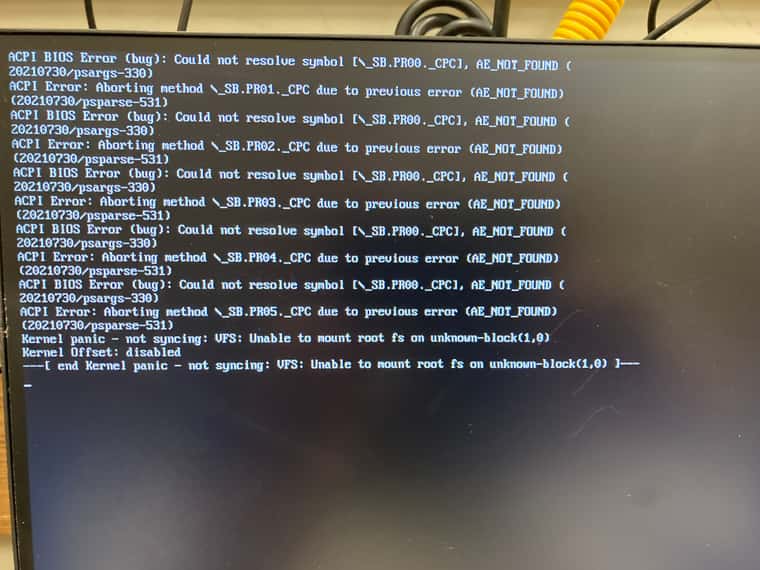@george1421 As far as the part of the environment I have control over, no. Not sure if there was a network change. However that being said nothing changed with apache. I ran the installer again using the -S option and it completed but the issue persists. Just seems odd that it won’t chain during the first attempt but works after running the autoboot command. Can I PM you a webm video recording of the vm I’m testing with? It is about 400KB.
EDIT: I added the fog server ip to the apache2.conf file at the bottom of the file as “ServerName <fogip>” and got rid of that AH00558 error message, but it didn’t fix the issue. Also autoboot doesn’t always work the first try, eventually it does though.
apache2ctl -S
AH00558: apache2: Could not reliably determine the server's fully qualified domain name, using <fogserverhostname>. Set the 'ServerName' directive globally to suppress this message
VirtualHost configuration:
*:80 <fogserverip> (/etc/apache2/sites-enabled/001-fog.conf:1)
*:443 <fogserverip> (/etc/apache2/sites-enabled/001-fog.conf:16)
ServerRoot: "/etc/apache2"
Main DocumentRoot: "/var/www/html"
Main ErrorLog: "/var/log/apache2/error.log"
Mutex watchdog-callback: using_defaults
Mutex rewrite-map: using_defaults
Mutex ssl-stapling-refresh: using_defaults
Mutex ssl-stapling: using_defaults
Mutex proxy: using_defaults
Mutex ssl-cache: using_defaults
Mutex default: dir="/var/run/apache2/" mechanism=default
Mutex mpm-accept: using_defaults
PidFile: "/var/run/apache2/apache2.pid"
Define: DUMP_VHOSTS
Define: DUMP_RUN_CFG
User: name="www-data" id=33
Group: name="www-data" id=33
/etc/apache2/sites-enabled/001-fog.conf
<VirtualHost *:80>
<FilesMatch "\.php$">
SetHandler "proxy:fcgi://127.0.0.1:9000/"
</FilesMatch>
KeepAlive Off
ServerName <fogserverip>
ServerAlias <fogserverhostname>
DocumentRoot /var/www/
RewriteEngine On
RewriteCond %{REQUEST_METHOD} ^(TRACE|TRACK)
RewriteRule .* - [F]
RewriteRule /management/other/ca.cert.der$ - [L]
RewriteCond %{HTTPS} off
RewriteRule (.*) https://%{HTTP_HOST}/$1 [R,L]
</VirtualHost>
<VirtualHost *:443>
KeepAlive Off
<FilesMatch "\.php$">
SetHandler "proxy:fcgi://127.0.0.1:9000/"
</FilesMatch>
ServerName <fogserverip>
ServerAlias <fogserverhostname>
DocumentRoot /var/www/
SSLEngine On
SSLProtocol all -SSLv3 -SSLv2
SSLCipherSuite ECDHE-RSA-AES128-GCM-SHA256:ECDHE-ECDSA-AES128-GCM-SHA256:ECDHE-RSA-AES256-GCM-SHA384:ECDHE-ECDSA-AES256-GCM-SHA384:DHE-RSA-AES128-GCM-SHA256:DHE-DSS-AES128-GC>
SSLHonorCipherOrder On
SSLCertificateFile /var/www/fog//management/other/ssl/srvpublic.crt
SSLCertificateKeyFile /opt/fog/snapins/ssl//.srvprivate.key
SSLCACertificateFile /var/www/fog//management/other/ca.cert.pem
<Directory /var/www/fog/>
DirectoryIndex index.php index.html index.htm
</Directory>
RewriteEngine On
RewriteCond %{REQUEST_METHOD} ^(TRACE|TRACK)
RewriteRule .* - [F]
RewriteCond %{DOCUMENT_ROOT}/%{REQUEST_FILENAME} !-f
RewriteCond %{DOCUMENT_ROOT}/%{REQUEST_FILENAME} !-d
RewriteRule ^/fog/(.*)$ /fog/api/index.php [QSA,L]
</VirtualHost>




